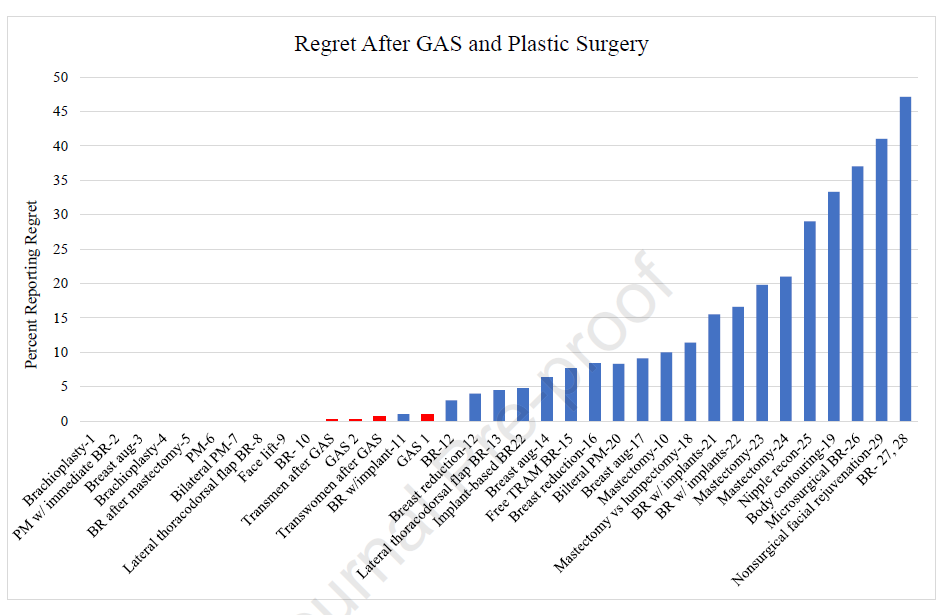News Analysis
“The arc of the moral universe is long, but it bends toward justice”
Honoring King’s legacy includes recognition of the important contributions by a close advisor, a Black gay man, Bayard Rustin
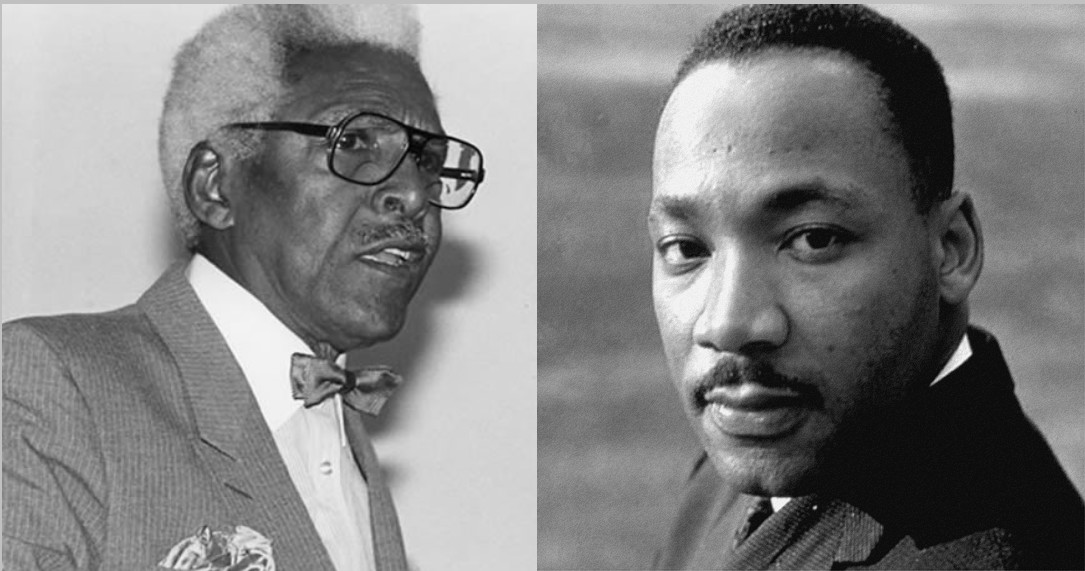
Editor’s note: The following piece marking today’s remembrance of Dr. Martin Luther King Jr. contains archival reporting and material by former Los Angeles Blade reporter & News Editor Karen Ocamb.
LOS ANGELES – In his remarks delivered to congregants and dignitaries gathered to remember and honor the Reverend Dr. Martin Luther King Jr. at his pastoral church, the Ebenezer Baptist Church in Atlanta, Georgia on Sunday, President Joe Biden emphasized the slain civil rights leader’s role as “a nonviolent warrior for justice.”
“Dr. Martin Luther King was born into a nation where segregation was a tragic fact of life. He had every reason to believe, as others of the generation did, that history had already been written, that the division would be America’s destiny. But he rejected that outcome. He heard Micah’s command to do justice, love mercy, and walk humbly,” the president said.
“And so, often, when people hear about Dr. King, people think of his ministry and the movement, or most about the epic struggle for civil rights and voting rights. But we do well to remember that his mission was something even deeper. It was spiritual. It was moral,” Biden pointed out.
The gathering at the Ebenezer Baptist Church took place on what would have been King’s 94th birthday. Referring to King’s legacy of accomplishments advancing civil rights for not just only Black Americans but all Americans, especially those oft times disenfranchised Biden noted:
“The soul of America is embodied in the sacred proposition that we’re all created equal in the image of God. That was the sacred proposition for which — for which Dr. King gave his life. It was a sacred proposition rooted in Scripture and enshrined in the Declaration of Independence. A sacred proposition he invoked on that day in 1963 when he told my generation about his dream — a dream in which we’re all entitled to be treated with — my father’s favorite word — dignity and respect. A dream in which we all deserve liberty and justice. And it is still the task of our time to make that dream a reality, because it’s not there yet.”
Towards the end of his remarks the president reflected saying: “Folks, I often think of the question that Dr. King asked us all those years ago. I think it’s important. You all remember; I think it’s important the nation remember it. He said, “Where do we go from here?” That’s a quote. “Where do we go from here?”
Looking back at King’s legacy Biden referred to, history often focuses on the extraordinary leadership of Dr. King in the early 1960s, but in honoring him and his commitments to advancing civil rights there is also a component of his work that was supported and advanced by a courageous Black gay man.
Biden in his remarks on Sunday referred to the seminal moment in the civil rights movement- the March on Washington in 1963, a massive showing of the need for equality for Black Americans. The organizer of the famous 1963 March on Washington for Jobs and Freedom, who worked alongside King, was Bayard Rustin—the openly gay economic justice and civil rights activist along with A. Philip Randolph, a Black labor unionist and civil rights activist.
Rustin and King had a lengthy partnership as activists chronicled in this excerpt by gay historian John D’Emilio’s essay “Reading the Silences in a Gay Life: The Case of Bayard Rustin:”
—“During the Montgomery Bus Boycott, Rustin travelled to Alabama to advise Dr. Martin Luther King, Jr., counseling him on the strategies and tactics of non-violent resistance. In the wake of the eventual triumph in Montgomery, Rustin became one of King’s most trusted advisors and a highly influential strategist for the movement.
While Rustin helped to orchestrate King’s rise to power, his sexuality made King and the movement vulnerable to attack. Rustin never hid his sexuality; It was an “open secret.” In 1960, King and Rustin planned to stage a demonstration at the Democratic National Convention in Los Angeles. Adam Clayton Powell, the Congressman from Harlem, feared the demonstrations would undermine his own power. Powell called King and told him to cancel the demonstrations, threatening to “reveal” that King and Rustin were having an affair. There was no affair, but King capitulated and Rustin resigned, forced out of the movement he had helped create.
For three years, Rustin lived in a kind of exile. During that time, white opposition to the Civil Rights Movement intensified, and the South erupted in violence. Finally, in June of 1963, the leaders of the movement decided it was time to organize a massive march on Washington. Movement leaders knew that Rustin was best qualified to organize the march, but feared his sexuality would be used to discredit the movement. In order to distance Rustin from the march, they appointed A. Philip Randolph director. Randolph, in turn, appointed Rustin his deputy.
But civil rights opponents were not fooled. As plans for the march took shape, J. Edgar Hoover passed Rustin’s arrest record to Strom Thurmond, the segregationist Senator from South Carolina. The next day, the movement’s leaders’ fears were realized as Thurmond took to the Senate floor, Rustin’s arrest record in hand, and declared that the march was being organized by a “pervert.”
This time, because the attack was coming from a bigoted Southern politician, movement leaders stood by Rustin. Plans for the march continued, and in August of 1963, a quarter of a million Americans gathered in Washington, demanding that Congress put an end to officially-sanctioned racism. “The March” was the watershed event in the history of the Civil Rights Movement, and Rustin was largely responsible for its success. It was the high point of his career.”—
“When an individual is protesting society’s refusal to acknowledge his dignity as a human being, his very act of protest confers dignity on him.” – Bayard Rustin
“In this moment in time, acknowledging everyone’s identities is more important than ever,” Rev. Jason Carson Wilson, lead organizer of a Rustin event in Washington DC, said in a statement. “Bayard Rustin brought his Blackness, queerness and Quaker sensibilities to every table at which he sat and to every protest he attended.”
Rustin’s long-time partner, Walter Naegle, accepted Rustin’s posthumously-awarded Presidential Medal of Freedom from President Barack Obama in 2013, the Washington Blade noted.
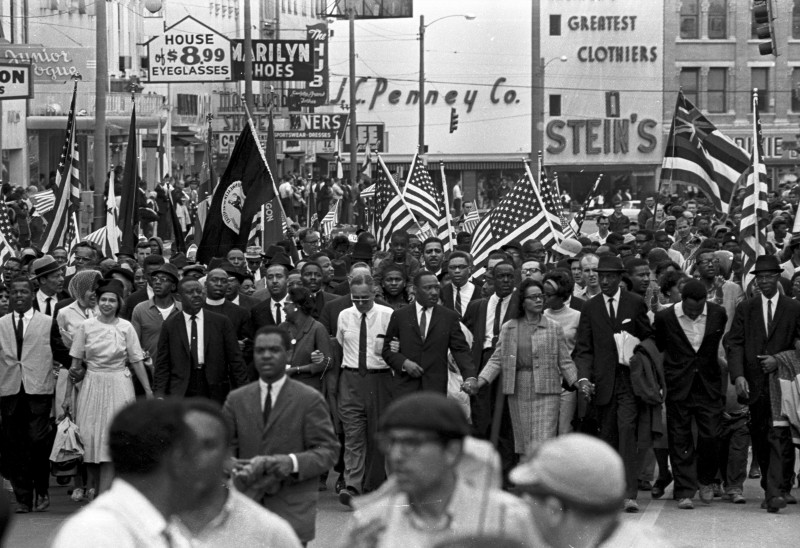
(Photo by Spider Martin, courtesy of Tracy Martin)
History often focuses on the extraordinary leadership of Rev. Dr. Martin Luther King Jr. in the early 1960s as he led a nonviolent crusade for civil rights. Spider Martin’s famous photo of John Lewis, Rosa Parks, Ralph Abernathy, Juanita Abernathy, Ralph Bunche, Martin Luther and Coretta Scott King, Frederick Reese and Hosea Williams marching through Montgomery, Alabama to the Capitol illustrates the passion behind the black voter registration drive after the Civil Rights Act of 1964—with the white supremacist danger ominously lurking in the background that March 25, 1965.
Openly gay organizer Rustin was also there, with A. Philip Randolph, John Lewis, Coretta Scott King, Rev. Dr. Martin Luther King Jr. and Rev. Ralph Abernathy. Their often bloody efforts led to the Voting Rights Act of 1965.
But by 1968, King shifted his attention to opposition to the war in Vietnam since the military draft called up mostly poor young men of color as privileged whites used college or medical deferments (like bone spurs) to dodge the draft. King also opposed the Vietnam War because it took resources away from President Johnson’s promised War on Poverty.
King was planning the Poor People’s Campaign for economic opportunity and equality when Rev. James Lawson, pastor of the Centenary Methodist Church in Memphis (who later served as pastor of Holman United Methodist Church in South LA from 1974 until his retirement in 1999) invited King to participate in a city-wide boycott to support striking black sanitation workers. The strike started after two black workers were accidentally crushed to death by the trash truck’s compactor on a rainy Feb. 1, 1968.
In a separate incident on the same day, 22 black sewer workers were sent home without pay, though their white supervisors stayed on with pay. On Feb. 12, more than 1,100 black sanitation workers went on strike for job safety, better wages and benefits and union recognition.
The first march didn’t go well, with rowdy students smashing windows and looting. King left and only returned after feuding factions agreed to unity and nonviolence. On April 4, Lawson and Andrew Young, representing King’s Southern Christian Leadership Conference (SCLC), worked out an agreement with a judge who had imposed an injunction on the march. Young conveyed news about the meeting that evening as King and his colleagues prepared to go to dinner.
King was assassinated at 6:01 pm by white supremacist sniper James Earl Ray as he stepped out on the balcony of Lorraine Motel in Memphis.
Every year, most of America remember King, emphasizing his “I Have a Dream” speech at the 1963 March on Washington and “I have been to the mountaintop” speech the night before his assassination. But on the occasion of the 50th anniversary of his death, former President Barack Obama and the late Georgia Rep. John Lewis joined a My Brother’s Keeper Alliance roundtable with students from Ron Brown College Preparatory High School in Washington, D.C. to discuss his legacy. Lewis also published a remembrance through the Obama Foundation:
— “Fifty years ago today, I was with Robert Kennedy in Indianapolis when we heard that Dr. Martin Luther King Jr. had been shot and killed.
The leader of our movement for civil rights was gone, assassinated on April 4, 1968, in Memphis.
And I believe something died in all of us that day. Something died in America.
But I’ve also always held the belief that what he left us — the way of hope, the way of peace, the way of love, a philosophy and discipline rooted in nonviolence — cannot be taken away. These things are eternal.
On Monday, I had the privilege of meeting with President Obama and a group of young men in Washington, D.C. for a My Brother’s Keeper Alliance roundtable. Together, we commemorated the legacy of Dr. King, celebrated his life, and looked to the future.
I believe we can always do more to embody the teachings of Dr. King, not just on the anniversary of his death, but every day.
And young people are demonstrating that spirit to us. They are organizing and speaking up. They’re marching. They’re demanding more for themselves and their generation.
And so I had a message for the young folks I met with this week.
When I was growing up as a child in Alabama, I saw crosses that the Klan had put up. I saw signs that said “white” and “colored.” There were places we couldn’t go. The majority of African Americans could not participate in a democratic process in the South. We could not register to vote. And when I first came to Washington to go on the Freedom Rides in 1961, black people and white people couldn’t be seated together on a Greyhound bus leaving this city.
When I got involved in the Civil Rights Movement as a young man, we’d sit in at restaurants. People would spit on us, put their cigarettes out on us, pour hot coffee down our backs. I was arrested 45 times in the 1960s. I was beaten, left bloody and unconscious.
But I never gave up. And today, you cannot give up.
That’s what Dr. Martin Luther King can teach us today. His message is as important now as it was 50 years ago:
“The arc of the moral universe is long, but it bends toward justice.”
Because of King and the actions of so many others, we brought those signs down. We earned the right to sit in those restaurants. We earned the right to vote.
Now, all across the South and all across America, there are elected officials who are people of color. In the recent elections in Virginia and around the country, more people of color and more women were elected to positions of power. They are African American, Latino, Asian American, Native American. Our country is a much better place — a much different place — in spite of all the setbacks and interruptions of progress.
Dr. King taught us to be brave, to be courageous, to be bold. I don’t know where America would be, where many of us of color would be, were it not for him.
His legacy was to speak up, stand up. When you see that something isn’t right or fair, you have to do something — you have to get in the way. Get into good trouble.”
News
Trump’s vow to invoke national emergency powers and use military force for mass deportations roils LA
Fearing loss of constitutional rights, executive overreach, and military involvement in civil law enforcement, immigration community scrambles
Donald Trump has made clear his intention to begin mass deportations immediately upon taking office on January 20, 2025, a promise he made repeatedly during his 2024 presidential campaign.
“On Day 1, I will launch the largest deportation program in American history to get the criminals out,” he declared during a rally at Madison Square Garden in the final days of the presidential race. “I will rescue every city and town that has been invaded and conquered, and we will put these vicious and bloodthirsty criminals in jail, then kick them the hell out of our country as fast as possible.”

This week, for the first time, Trump vowed to invoke national emergency powers to execute this plan and, particularly troubling, will use the Armed Services to do so.
National emergency declarations have long been used by U.S. presidents to access extraordinary powers, often bypassing congressional oversight. The National Emergencies Act (NEA) of 1976 was designed to prevent unchecked executive authority, but its provisions have failed to effectively curb presidential overreach. While the act sets guidelines for declaring national emergencies, presidents have frequently invoked this power to justify wide-ranging actions, from military interventions (abroad) to surveillance programs (domestically and abroad).
For example, in the aftermath of the September 11 attacks, President George W. Bush invoked national emergency powers to pass the Patriot Act, which allowed for sweeping surveillance and counterterrorism measures with minimal congressional oversight. This precedent establishes a concerning foundation for Trump’s proposed use of emergency powers in the realm of immigration enforcement.
Trump’s pledge to invoke emergency powers to detain, round up, and deport over 11 million undocumented immigrants would result in a domestic military operation of unprecedented scale.
He vows to build “vast holding facilities that would function as staging centers” for immigrants as their cases progressed and they waited to be flown to other countries. While large-scale deportation efforts have been attempted in the past—most recently President Eisenhower’s “Operation Wetback” in the 1950s, which deported 1.1 million people—today’s proposed numbers are far greater. Even the Obama administration, which deported 1.8 million people during its tenure, faced significant legal and logistical hurdles that made large-scale deportations difficult to carry out quickly and without consequence.
Many hurdles exist.
Legal challenges are almost certain to engulf Trump’s administration should it pursue such a plan. These challenges will include key issues such as whether the president can lawfully bypass Congress to enforce mass deportations. There will also be significant legal disputes surrounding the treatment of detained immigrants, particularly their Due Process rights under the U.S. Constitution.
The 2018 Supreme Court case Jennings v Rodriguez, reaffirmed that due process protections apply to all individuals on U.S. soil, regardless of immigration status, guaranteeing them rights such as bond hearings and access to counsel.
Any attempt to bypass these rights would invite immediate and substantial legal challenges, further complicating Trump’s efforts.
In addition to these legal complexities, the logistical challenges of executing such a massive operation would be immense. Deporting millions of individuals would require extensive resources for transportation, housing, medical care, and sustenance. Some estimate the price tag could exceed $300 billion dollars.
The U.S. government would need to significantly expand detention facilities and infrastructure to accommodate such a large influx of detainees.
Historical attempts to increase detention capacity, such as the family detention centers under Obama, faced severe criticism for overcrowding, inhumane conditions and the violation of human rights.
Legal objections are likely to arise concerning the use of armed military personnel in civilian spaces. Deploying military forces for domestic law enforcement operations could violate the Posse Comitatus Act, which restricts the use of military personnel in civilian law enforcement activities. Previous efforts to militarize U.S. immigration enforcement—such as the use of the National Guard at the U.S.-Mexico border—faced constitutional challenges and public backlash.
If Trump proceeds with using the military for mass deportations, it would almost certainly prompt immediate legal challenges based on this law.
Trump has long expressed disdain for the traditional system of checks and balances, viewing even basic constitutional arguments as an obstacle to his leadership.
He has shown that he will not hesitate to bypass Congress and other governmental processes for key appointments. For example, during his first term, Trump repeatedly sought to circumvent the Senate confirmation process, such as with his appointments to the Department of Justice and Health and Human Services, where he clashed with Senate Democrats over key nominations.
Trump is not shy about his broader desire to centralize power within the executive branch, diminishing the role of both the legislative and judicial branches. His antagonism toward agencies like the National Security Council and the Homeland Security Council—which he has accused of undermining his administration—further underscores his aim to weaken institutional checks on executive power. If unchecked, we could see a presidency where unilateral decisions by the executive become the norm, with minimal oversight from Congress or the courts.
Already, Trump has signaled his intent to appoint loyalists to key agencies, many of which he clashed with or feels have hindered his agenda. Examples include his controversial Pentagon appointments, as well as his selection of Director of National Intelligence and Health and Human Services leaders, who have been seen as part of his push to exert more control over agencies he perceives as obstructionist or hostile. He has already assigned a Border Czar, Tom Homan, who separated thousands of families at the border during Trump’s first term; that policy resulted in children never again being found.
Seizing emergency powers would allow Trump to bypass some, but not all, political and legal barriers to implementing his deportation plan.
To make it more feasible, he would likely need to suspend aspects of Due Process protections, militarize public spaces and bypass rules surrounding the detention of individuals without adequate hearings or access to credible legal counsel. This would create a system where any individual could be detained, processed and deported with no actual regard for constitutional protections.
In short, a frustrated Trump—empowered by a Republican-majority Congress and a potentially willing DOJ and Supreme Court—might attempt to suspend the constitution.
This is not without precedent.

Over 120,000 people of Japanese descent were interned in camps throught out the US during World War II, including 20,000 at Los Angeles County’s Santa Anita Assembly Center. (Photo: PBS)
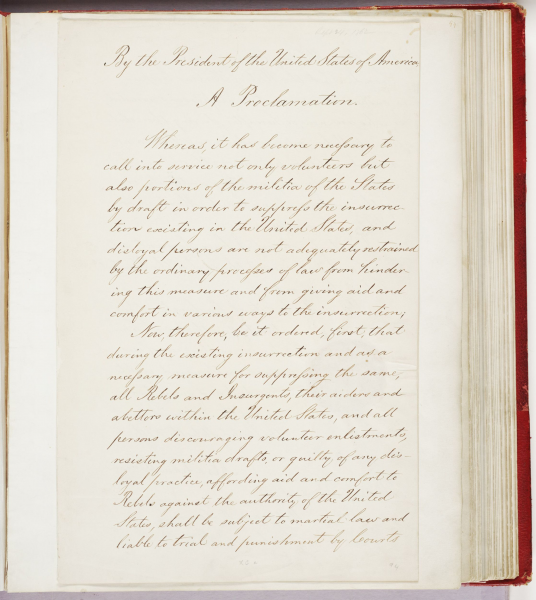
In 1862, President Lincoln issued Presidential Proclamation 94 which suspended the writ of habeas corpus. (Photo from National Archives education division)
During the Civil War, Abraham Lincoln suspended habeas corpus to suppress dissent, and during World War II, Franklin D. Roosevelt’s internment of Japanese Americans involved the suspension of their constitutional rights in the name of national security.
While these actions were taken during times of war, they set dangerous precedents for the suspension of civil liberties in the face of perceived national crises. Trump has called the immigration an ‘invasion’ and has referred to migrants and their protectors as the ‘enemy within.’
Though few are publicly contemplating this possibility, we must acknowledge that we are on a trajectory toward some form of civil rights suspension, and certainly, we are witnessing a potential for widespread executive overreach.
At the local level, cities and states have vowed to resist Trump’s immigration plans.
The Los Angeles City Council has declared itself a Sanctuary City, and Mayor Karen Bass has pledged that no city resources or personnel will support deportation efforts.
Similarly, Governor Gavin Newsom of California has made declarations on behalf of the state.
However, these measures do not prevent the federal government from taking action on the ground.
In fact, Trump and Congress have the authority to terminate federal funding to uncooperative states and local governments.
In 2021, for example, California received over $150 billion in federal funding, which could be withheld as political leverage at every turn to force compliance with federal immigration policies.
Most immigration rights advocates, attorneys and others want to point out that there is every reason to remain hopeful and that Due Process rights, good judges and justice minded citizens will work to protect most people from unjust treatment and deportation.
However, it’s not clear what Due Process or advocacy might look like if Trump militarizes the process and suspends the Constitution.
There are currently several immigration violations that could lead to the deportation of individuals attempting to remain in the U.S. and people who entered the country without authorization are often a focus of immigration enforcement, particularly under the Trump administration.
However, the specifics of deportation policies can vary and it’s important to note that many individuals who entered the U.S. improperly have remained in the country for years, blending into communities.
Some of these individuals have applied for asylum or are in the process of adjusting their status through other legal avenues, such as family-based petitions or employment-based green card applications.
The process for detaining and deporting these individuals can depend on several factors, including whether they have a criminal record, whether they are in removal proceedings or their current legal status.
Ally Bolour, a well-known immigration attorney based in Los Angeles, says he has faith in Due Process but is “concerned that the process may become much more restrictive and that due process may be minimal and not applied fairly.”
Bolour has since 1996 worked with individuals facing deportation and specializes in cases involving people who have entered the U.S. without authorization and those seeking asylum.
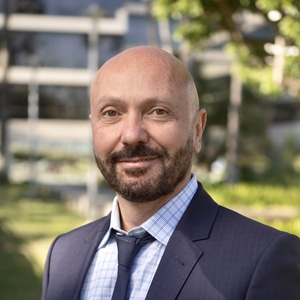
“Sensitivity to the queer minority is going to be minimal,” under Trump’s immigration system, he says.. “They won’t care. It’s literally a fact that, if you are a gay person fleeing the Islamic Republic, you’re fleeing because they’re gonna hang you. Credible fear. But after January 20, as I see it,chances of a gay Iranian being able to and pass the credible fear becomes more difficult than it is today.”
Los Angeles Blade spoke with Bolour about 23 year old Jesus, one of the more than 200,000 LGBTQ immigrants who have made their way to California in the past few years.
His immigration situation as an asylum seeker today illustrates the impact a growing maze of intentional legal and bureaucratic hurdles has on immigrants’ ability to advance their cases.
Jesus made his way to the U.S. seeking refuge from the violence and instability that defined his life in Venezuela.
Born in Caracas, Jesus’ childhood was marked by the unraveling of his family’s middle-class life as Venezuela descended into political and economic chaos. His father, once a government worker loyal to Hugo Chávez, witnessed the system’s collapse from within. He refused to comply with orders from high-ranking officials like Diosdado Cabello, resulting in the family’s swift downfall.
Jesus’ early years were defined by loss, as their possessions and status vanished, leaving them targets of a ruthless government.
Venezuela’s economic collapse, particularly between 2013 and 2023, created unimaginable hardship. Hyperinflation and a crumbling economy made basic necessities unattainable, and survival became a daily struggle. But for Jesus, being gay in a country that became increasingly hostile to LGBTQ people added another layer of peril.
“In Venezuela, being gay isn’t just a social challenge—it’s a potential death sentence,” he explains, recalling countless friends lost to violence or suicide. The societal rejection and threats, he says, were constant.
Faced with this brutal reality, Jesus made the decision to flee Venezuela. “It wasn’t impulsive; it was a matter of survival” he says. Part of a larger wave of over 7 million Venezuelans fleeing the country, Jesus traveled to Mexico City, then to Tijuana, before crossing the U.S. border on foot near San Diego. He chose to surrender to U.S. border authorities, a decision that led to his detention across various facilities in the Southwestern and Southeastern U.S.
During his six months in detention, Jesus faced COVID-19, potential deportation, and constant uncertainty. Yet, even in these grim circumstances, he found a sense of community among other LGBTQ detainees. “We watched out for each other,” he recalls. Eventually, a friend bailed him out.
Today, Jesus works and lives in California, grateful for his newfound safety but now facing the prospect of having his American journey crushed by Donald Trump.

Jesus mingles in the crowd at a recent Washington DC Pride celebration. (Photo by Los Angeles Blade)
Because he crossed the U.S. border illegally, his designation remains “Entered Without Inspection” (EWI)—a status that may pose a significant threat to his ability to remain in the country.
Trump’s immigration round up plan appears to target individuals with EWI status no matter how long they have been in the country or where they are in the process of becoming a visa holder (witness his determination to remove even American-born adult children of elderly immigrants in this status).
In an effort to strengthen Jesus’ case, his attorney has suggested a bold and complicated strategy: leave the U.S. and re-enter through legal channels.
Attorney Bolour says he would advise against this strategy for someone like Jesus.
“For those with pending asylum applications and an expired TPS, it is very difficult to obtain Advanced Parole,” he says. “There are significant risks involved.” He recommends that people in this situation “do not travel until they have some form of approved status, such as TPS.”
Bolour notes that “every case is different” and it is imperative that people “consult with counsel before making any firm decisions.”
In the case of Jesus, if he was able to wipe the EWI status from his record, it might help him avoid the First Country Rule.
This rule mandates asylum seekers apply for asylum in the first country they reach after fleeing their home country, and for Jesus, that country was Mexico. If he were able to reset his immigration record, this rule might potentially no longer apply to him.
However, his ability to exit the US and reenter is made risky because his Temporary Protected Status , which had allowed him to stay in the U.S. without fear of deportation, expired in March 2024. Since then, he has been waiting for his renewal application to be processed.
TPS was set for automatic renewal but the system has conveniently failed to renew status for thousands of people.
Without a valid TPS, Jesus cannot legally leave the U.S., as doing so would trigger an automatic ban on his re-entry.
To leave the country legally, he would need to apply for Advanced Parole, a document that permits individuals to travel abroad temporarily without risking their legal status.
But obtaining Advanced Parole is no simple feat. The application process can take months and even if expedited, there is no guarantee of timely approval. It’s impossible, however, without an active TPS.
The intersection of expired TPS, bureaucratic delays and the looming threat of U.S. military lead deportation and harsh immigration policies leaves Jesus in a state of perpetual uncertainty.
Bolour says everyone “must be prepared for the worst possible outcome: a systematic erosion of civil rights, aggressive federal action, and a significant legal, human rights, and constitutional crisis.”
To that end, Bolour says the most important thing any person facing immigration challenges should have, is a plan:
- Remain Calm:
- Stay calm and do not physically resist. Immigration agents have the authority to detain you, but resisting can lead to additional charges or complications.
- NOTE: If agents appear at your door with a warrant for your arrest, do not let them in unless the warrant has been signed by a judge.
- Know Your Rights:
- You have the right to remain silent and not answer questions about your immigration status. You also have the right to ask for a lawyer. Remember, anything you say can be used against you in the future.
- You have the right to remain silent and not answer questions about your immigration status. You also have the right to ask for a lawyer. Remember, anything you say can be used against you in the future.
- Request to Contact an Attorney:
- Ask to speak with an immigration attorney immediately. You have the right to legal counsel, and an attorney can guide you through the process and ensure your rights are protected.
- Ask to speak with an immigration attorney immediately. You have the right to legal counsel, and an attorney can guide you through the process and ensure your rights are protected.
- Do Not Sign Any Documents Without Legal Advice:
- Do not sign anything without understanding what it means. Immigration officials may ask you to sign forms or waivers, which could impact your case. Consult with an attorney before signing any documents.
- Do not sign anything without understanding what it means. Immigration officials may ask you to sign forms or waivers, which could impact your case. Consult with an attorney before signing any documents.
- Provide Only Basic Information:
- Only provide your name, address, and date of birth. Avoid answering other questions or providing more personal information without a lawyer present.
- Only provide your name, address, and date of birth. Avoid answering other questions or providing more personal information without a lawyer present.
- Limit Social Media posts:
- Do not post private information or photos and restrict your interactions to known participants. If your page is public, set to friends only and do not share your location.
- Do not post private information or photos and restrict your interactions to known participants. If your page is public, set to friends only and do not share your location.
- Document the Detention:
- If possible, have a trusted friend or family member document your detention, including the time, location, and agents involved. This information can be important for legal proceedings or for advocacy groups that may assist in your case.
- If possible, have a trusted friend or family member document your detention, including the time, location, and agents involved. This information can be important for legal proceedings or for advocacy groups that may assist in your case.
- Exercise Your Right to Make a Phone Call:
- You have the right to make a phone call to family, friends, or your attorney. Immigration authorities should allow you to call a lawyer, though this may vary by location.
- You have the right to make a phone call to family, friends, or your attorney. Immigration authorities should allow you to call a lawyer, though this may vary by location.
- Request a Hearing:
- You have the right to request a hearing in front of an immigration judge. Your attorney can help you with this process and inform you of any options for contesting your detention.
- You have the right to request a hearing in front of an immigration judge. Your attorney can help you with this process and inform you of any options for contesting your detention.
- Avoid Talking About Your Case:
- Do not discuss your case with other detainees, as it may be used against you. Stick to speaking with your lawyer or trusted individuals.
- Do not discuss your case with other detainees, as it may be used against you. Stick to speaking with your lawyer or trusted individuals.
- Stay in Contact with Support Networks:
- Keep your family, friends, and advocacy organizations informed about your situation so they can assist with legal or practical needs during the detention process.
- Keep your family, friends, and advocacy organizations informed about your situation so they can assist with legal or practical needs during the detention process.
- Create an emergency notification group:
- If you are detained or face any urgent situation, inform a trusted core group of family and friends who can collaborate to assist you.
By following such steps, Bolour says, you can help ensure that your legal rights are respected and that you have the best chance of navigating the immigration detention process effectively.
“It is affecting my health and I don’t know what my real options are,” says Jesus. “They keep adding rules and conditions and slowing my ability to keep the case up to date. It’s like a game of musical chairs where you run out of time to get to the right place before Trump stops the music.”
“But,” adds Jesus, “I am not going to give up. I can’t. Even though I don’t know what’s next.”
News Analysis
Time to double down in the fight for democracy
Our lives and liberties hang in the balance:
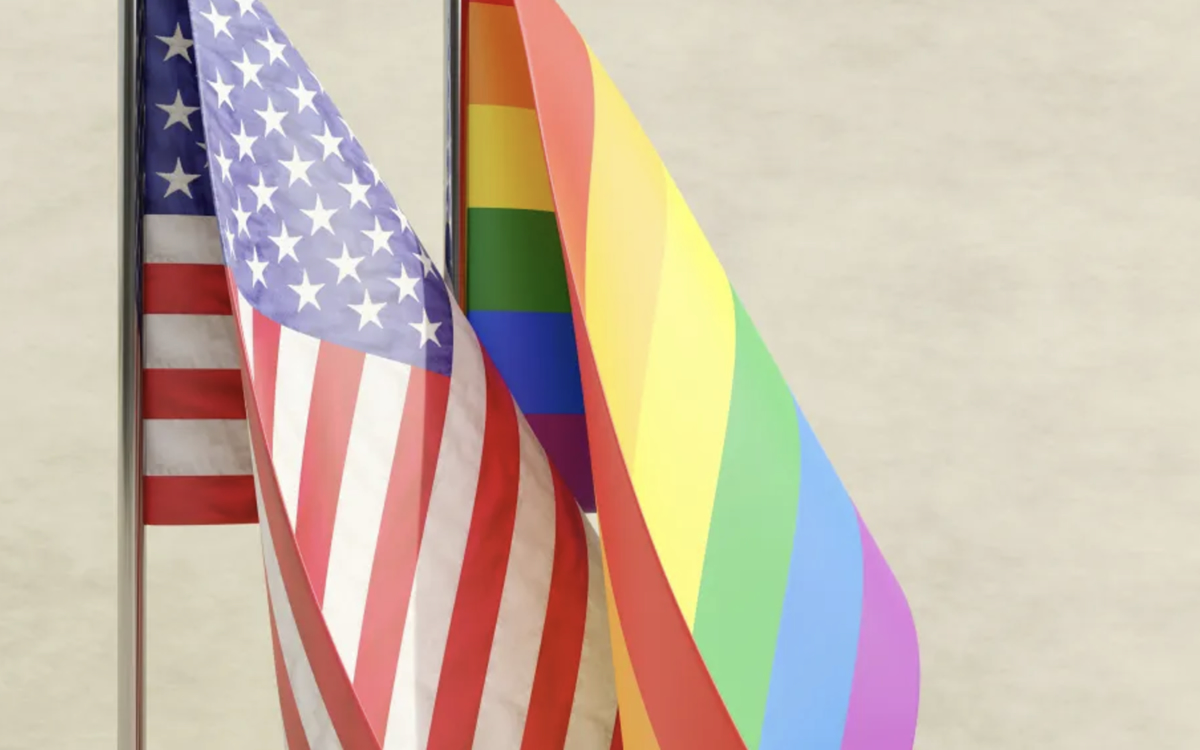
This Fourth of July, the LGBTQ community faces an unprecedented crisis as recent legal and political developments threaten to unravel all of our hard-won rights and protections. EVERY SINGLE ONE OF THEM.
The Supreme Court’s 6-3 ruling granting former presidents broad immunity from civil lawsuits for official acts has sent shockwaves through the community. This decision could empower future presidents, including a potential second Trump term, to take extreme actions against marginalized groups without fear of personal legal consequences.
“This ruling has catastrophic implications for LGBTQ rights,” warns Sarah Warbeck, director of the HRC’s LGBTQ Rights Project. “A president with such immunity could devastate our community’s protections, from workplace rights to healthcare access for transgender individuals.”
The immunity ruling, coupled with the Supreme Court’s conservative majority and the looming threat of an anti-LGBTQ administration, creates what activists describe as a “perfect storm” of vulnerability.
Critics highlight the mainstream media’s failure to adequately address Trump’s legal issues and his ties to conservative think tanks like the Heritage Foundation. The Foundation’s “Project 2025” is viewed by many as a blueprint for policies that could eviscerate LGBTQ rights.
While debates about President Biden’s capabilities persist, LGBTQ advocates emphasize the more pressing concern of Trump’s documented machine gun of lies, his misuse of power and ongoing felonious legal troubles.
“We must mobilize immediately to elect officials at all levels who will defend LGBTQ rights,” urges Rep. Mark Takano (D-Calif.). “There’s no room for complacency. Our community is under attack.”
LGBTQ leaders stress that this fight now encompasses fundamental issues of democratic governance and the balance of powers. They call for unprecedented solidarity, grassroots organizing, and civic engagement.
The Los Angeles Blade issues an urgent call to action: “Every LGBTQ individual, ally, and supporter must double down and engage in renewed activism and constant vigilance. Our lives and liberties hang in the balance,” says publisher Troy Masters. He adds, “Without a strong LGBTQ press, our community will indeed perish. We need your support.”
This Independence Day marks a critical juncture for the LGBTQ community. The time for action is now.
Get out of the weeds of the debate and save yourself.
Research/Study
LGBTQ people in LA County struggle with cost of living & safety
Approximately 665,000 LGBTQ adults live in Los Angeles County, according to new research from the Williams Institute
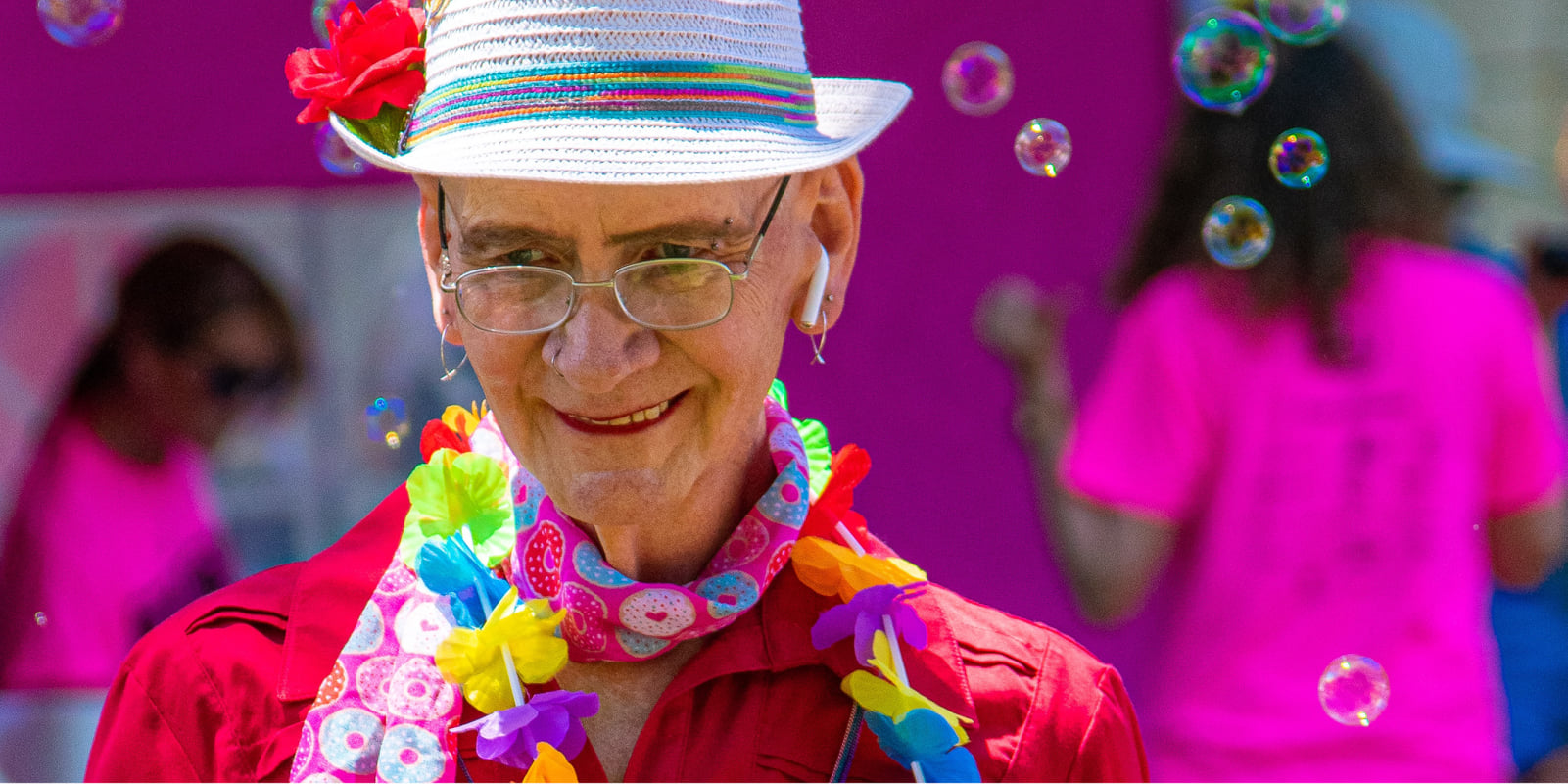
LOS ANGELES – Approximately 665,000 LGBTQ adults live in Los Angeles County, according to new research from the Williams Institute at UCLA School of Law that looks at the lived experiences and needs of LGBTQ people.
The majority (82%) believe that LA County is a good place for LGBTQ people to live and that elected officials are responsive to their needs. However, affording to live in LA County is their most common worry.
Over one-third (35%) of LGBTQ Angelenos live below 200% of the federal poverty level (FPL), including almost half (47%) of transgender and nonbinary people, and they experience high rates of food insecurity and housing instability.
Nearly one in three (32%) LGBTQ households in Los Angeles County and more than one in five (23%) non-LGBTQ households experienced food insecurity in the prior year. In addition, more than 60% of LGBTQ people live in households that are cost-burdened by housing expenses, spending 30% or more of their household income on housing. A quarter (26%) of LGBTQ people live in households where over 50% of the household’s monthly income is spent on rent or mortgage payments.
“LA County represents a promise of equality and freedom to LGBTQ people who live here and throughout the country,” said lead author Brad Sears, the Founding Executive Director at the Williams Institute. “But that promise is being undermined by the County’s rapidly escalating cost of living.”
This report used representative data collected from 1,006 LGBTQ adults in Los Angeles County who completed the 2023 Los Angeles County Health Survey (LACHS) conducted by the Los Angeles County Public Health Department. The data also included responses from 504 LGBTQ individuals who participated in the Lived Experiences in Los Angeles County (LELAC) Survey, a LACHS call-back survey developed by the Williams Institute.
More than half (51%) of LGBTQ adults said they have been verbally harassed, with 39% experiencing this in the past five years. As a result, one in five LGBTQ people have avoided public places such as businesses, parks, and public transportation in the last year. About 40% of LGBTQ people do not believe that law enforcement agencies in Los Angeles County treat LGBTQ people fairly.
A companion study published today surveyed 322 trans and nonbinary individuals in Los Angeles County. Results showed that the cost of living in LA County was the most significant concern for trans and nonbinary respondents, with 59% indicating that it is a serious problem. More than one-quarter (28%) of the participants were unemployed, compared to 5% of LA County overall.
The survey also revealed significant disparities in health and health care access, especially for trans and nonbinary adults who were women or transfeminine, immigrants, and those living at or near the FPL.
“Understanding the life experiences of trans and nonbinary people is important so that we can begin to improve the quality of our lives in LA County,” said study co-author Bamby Salcedo, President and CEO of the TransLatin@ Coalition. “Trans and nonbinary people are best suited to envision ways to support and uplift the community, along with trans-led organizations that have already been doing this work. LA County must commit to greater support of the organizations serving our community.”
Survey respondents were twice as likely as the general population of LA County to report having fair or poor health (27%), being uninsured (14%), and going without health care (46%).
“Despite a supportive policy environment in Los Angeles County, experiences of stigma and discrimination still exist and can hinder access to necessary resources for trans and nonbinary residents,” said lead author Jody Herman, Senior Scholar of Public Policy at the Williams Institute. “It is crucial for local officials and service providers to enact policies, provide education and training, and establish accountability to ensure respectful and positive interaction with the trans and nonbinary community.”
A third report focuses on LGBTQ people’s assessment of LA County programs and services and recommendations for local elected officials.
“These findings from the Williams Institute provide invaluable data that will guide our Board, County departments, and the inaugural LGBTQ+ Commission in shaping policies and programs to truly deliver for our diverse LGBTQ+ communities,” said LA County Board Chair Lindsey P. Horvath, who initiated the motion to present the findings to the Board.
“It’s especially critical that we support our trans, gender-nonconforming, and nonbinary communities, ensuring they feel safe and supported, and that they are able to afford to live in Los Angeles County. These insights will guide our essential and transformative work.”
“Many LGBTQ people provided recommendations for elected officials to improve quality of life in Los Angeles County,” said principal investigator Kerith J. Conron, Research Director at the Williams Institute. “LGBTQ people are asking for visible allyship, increased representation of LGBTQ individuals in elected positions and civil service, and housing and financial support.”
“These recent findings serve as a sobering reminder of the persistent barriers faced by the LGBT community in Los Angeles County,” said Dr. Barbara Ferrer, PhD, MPH, MEd, Director of Public Health. “These reports underscore the profound impact of the disparities on the health and wellbeing of a community that include our family members, colleagues, and friends. It is imperative that we not only acknowledge these inequities but actively engage in eliminating them. Through collaborative efforts with community leaders, policymakers, and the public, Public Health is committed to upholding principles of justice and equity by ensuring that every member of our community has the resources they need to thrive.”
Research/Study
New Polling: 65% of Black Americans support Black LGBTQ rights
73% of Gen Z respondents (between the ages of 12 and 27) “agree that the Black community should do more to support Black LGBTQ+ people”
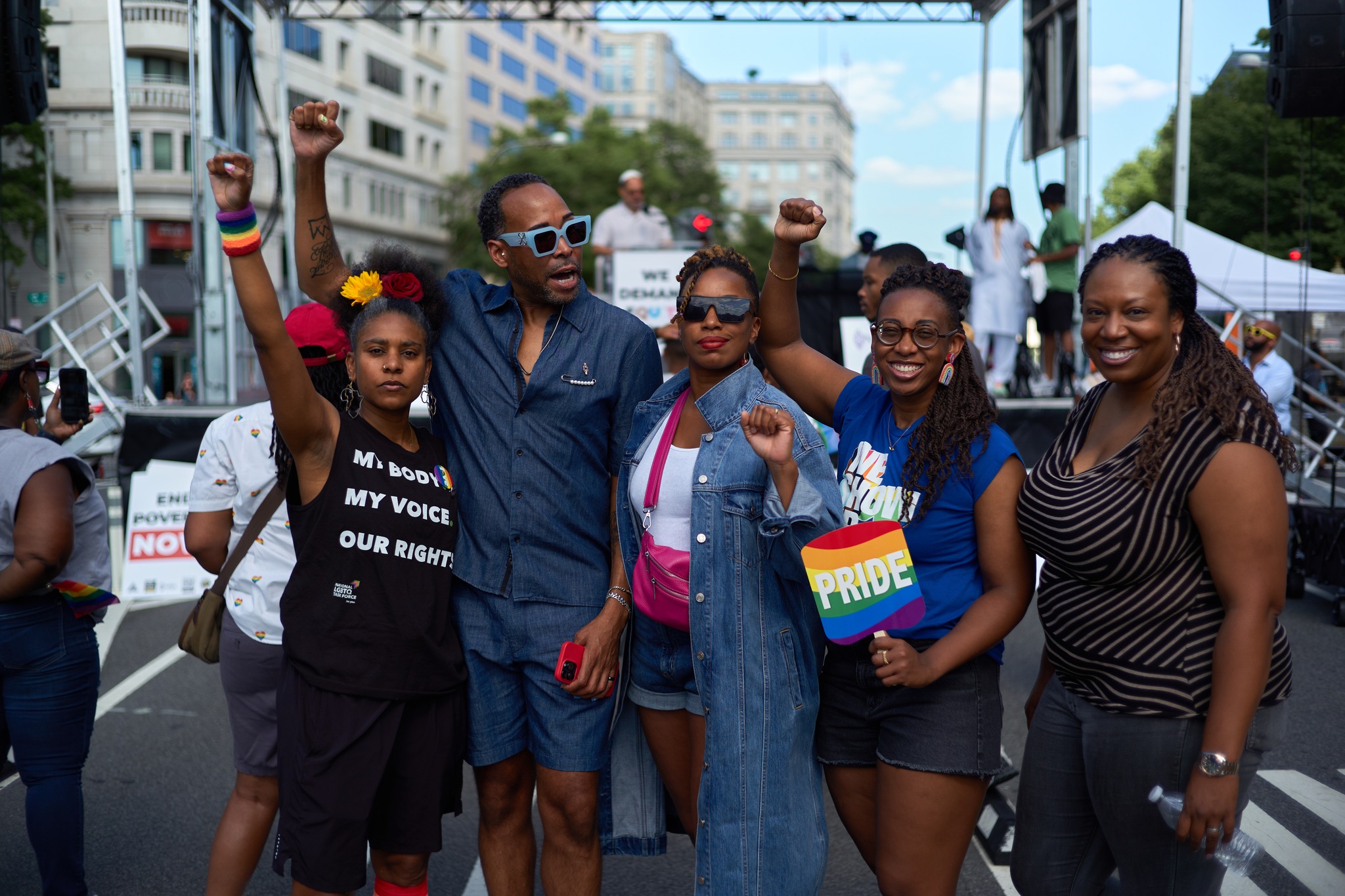
WASHINGTON – The National Black Justice Coalition, a D.C.-based LGBTQ advocacy organization, announced on June 19 that it commissioned what it believes to be a first-of-its-kind national survey of Black people in the United States in which 65 percent said they consider themselves “supporters of Black LGBTQ+ people and rights,” with 57 percent of the supporters saying they were “churchgoers.”
In a press release describing the findings of the survey, NBJC said it commissioned the research firm HIT Strategies to conduct the survey with support from five other national LGBTQ organizations – the Human Rights Campaign, the National LGBTQ Task Force, the National Center for Lesbian Rights, Family Equality, and GLSEN.
“One of the first surveys of its kind, explicitly sampling Black people (1,300 participants) on Black LGBTQ+ people and issues – including an oversampling of Black LGBTQ+ participants to provide a more representative view of this subgroup – it investigates the sentiments, stories, perceptions, and priorities around Black values and progressive policies, to better understand how they impact Black views on Black LGBTQ+ people,” the press release says.
It says the survey found, among other things, that 73 percent of Gen Z respondents, who in 2024 are between the ages of 12 and 27, “agree that the Black community should do more to support Black LGBTQ+ people.”
According to the press release, it also found that 40 percent of Black people in the survey reported having a family member who identifies as LGBTQ+ and 80 percent reported having “some proximity to gay, lesbian, bisexual, or queer people, but only 42 percent have some proximity to transgender or gender-expansive people.”
The survey includes these additional findings:
• 86% of Black people nationally report having a feeling of shared fate and connectivity with other Black people in the U.S., but this view doesn’t fully extend to the Black LGBTQ+ community. Around half — 51% — of Black people surveyed feel a shared fate with Black LGBTQ+ people.
• 34% reported the belief that Black LGBTQ+ people “lead with their sexual orientation or gender identity.” Those participants were “significantly less likely to support the Black LGBTQ+ community and most likely to report not feeling a shared fate with Black LGBTQ+ people.”
• 92% of Black people in the survey reported “concern about youth suicide after being shown statistics about the heightened rate among Black LGBTQ+ youth.” Those expressing this concern included 83% of self-reported opponents of LGBTQ+ rights.
• “Black people’s support for LGBTQ+ rights can be sorted into three major groups: 29% Active Accomplices, 25% Passive Allies (high potential to be moved), 35% Opponents. Among Opponents, ‘competing priorities’ and ‘religious beliefs’ are the two most significant barriers to supporting Black LGBTQ+ people and issues.”
• 10% of the survey participants identified as LGBTQ. Among those who identified as LGBTQ, 38% identified as bisexual, 33% identified as lesbian or gay, 28% identified as non-binary or gender non-conforming, and 6% identified as transgender.
• Also, among those who identified as LGBTQ, 89% think the Black community should do more to support Black LGBTQ+ people, 69% think Black LGBTQ+ people have fewer rights and freedoms than other Black people, 35% think non-Black LGBTQ+ people have fewer rights and freedom than other Black people, 54% “feel their vote has a lot of power,” 51% live in urban areas, and 75% rarely or never attend church.
Additional information about the survey from NBJC can be accessed here.
Research/Study
63% of LGBTQ+ people have faced employment discrimination
The report’s findings also show 70% of LGBTQ+ people feel lonely, misunderstood, marginalized, or excluded at work
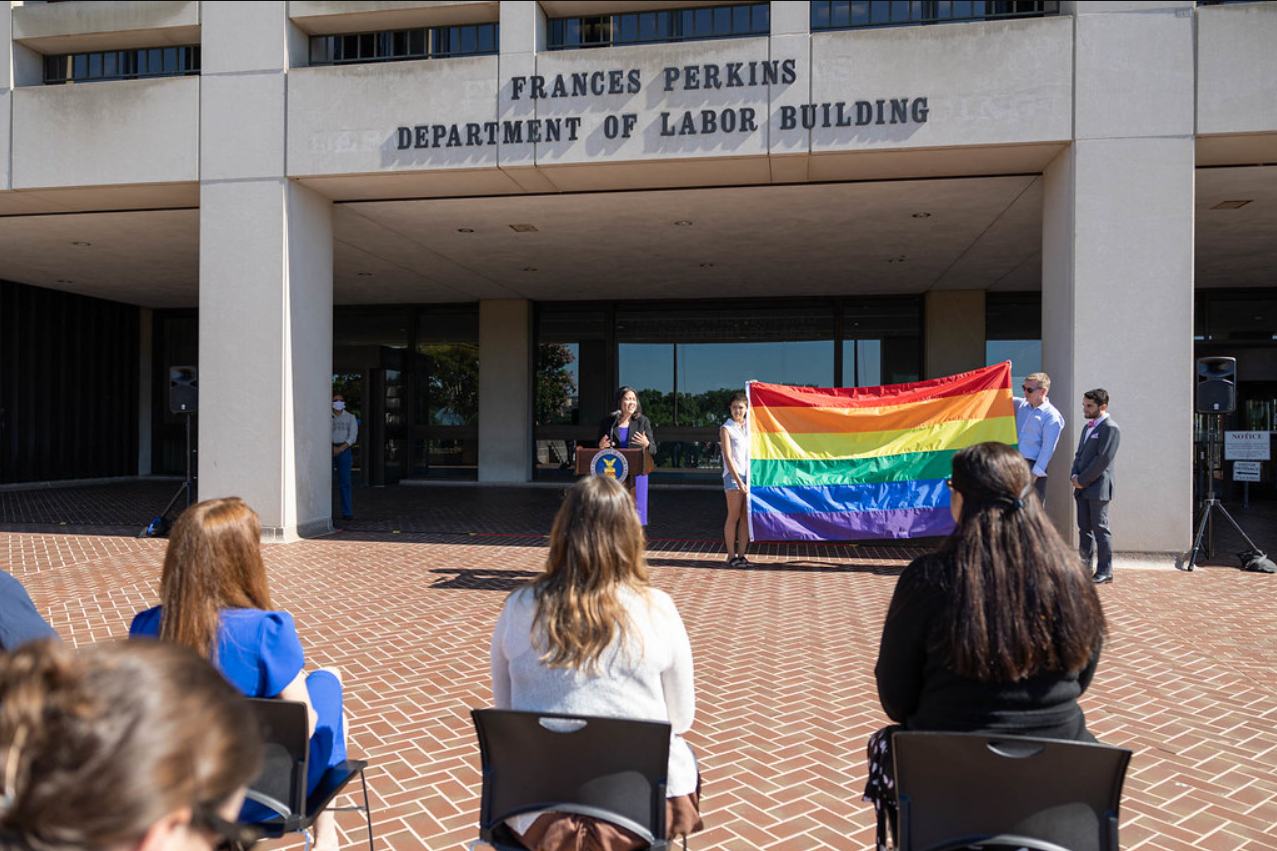
WASHINGTON -A newly released report on the findings of a survey of 2,000 people in the U.S. who identify as LGBTQ says 63 percent of respondents have faced workplace discrimination in their career, 45 percent reported being “passed over” for a promotion due to their LGBTQ status, and 30 percent avoid “coming out” at work due to fear of discrimination.
The report, called “Unequal Opportunities: LGBTQ+ Discrimination In The Workplace,” was conducted by EduBirdie, a company that provides s professional essay writing service for students.
“The research shows basic acceptance remains elusive,” a statement released by the company says. “Thirty percent of LGBTQ+ people are concerned they will face discrimination if they come out at work, while 1 in 4 fear for their safety,” the statement says. “Alarmingly, 2 in 5 have had their orientation or identity disclosed without consent.”
Avery Morgan, an EduBirdie official, says in the statement, “Despite progress in LGBTQ+ human rights, society stigma persists. Our findings show 70% of LGBTQ+ people feel lonely, misunderstood, marginalized, or excluded at work, and 59% believe their sexual orientation or gender identity has hindered their careers.”
According to Morgan, “One of the biggest challenges businesses should be aware of is avoiding tokenism and appearing inauthentic in their actions. Employers must be genuine with their decisions to bring a more diverse workforce into the organization.”
The report includes these additional findings:
• 44% of LGBTQ people responding to the survey said they have quit a job due to lack of acceptance.
• 15% reported facing discrimination “going unaddressed” by their employer.
• 21% “choose not to report incidents that occur at work.”
• 44% of LGBTQ+ workers feel their company is bad at raising awareness about their struggles.
• Half of LGBTQ+ people change their appearance, voice, or mannerisms to fit in at work.
• 56% of LGBTQ+ people would be more comfortable coming out at work if they had a more senior role.
At least 32 states and the District of Columbia have passed laws banning employment discrimination based on sexual orientation and gender identity, according to the Human Rights Campaign. The EduBirdie report does not show which states participants of the survey are from. EduBirdie spokesperson Anna Maglysh told the Washington Blade the survey was conducted anonymously to protect the privacy of participants.
The full report can be accessed here.
Research/Study
2024 GLAAD Social Media Safety Index: Social media platforms fail
Despite moderate score improvements since 2023 on LGBTQ safety, privacy, and expression, all platforms insufficiently protect LGBTQ users
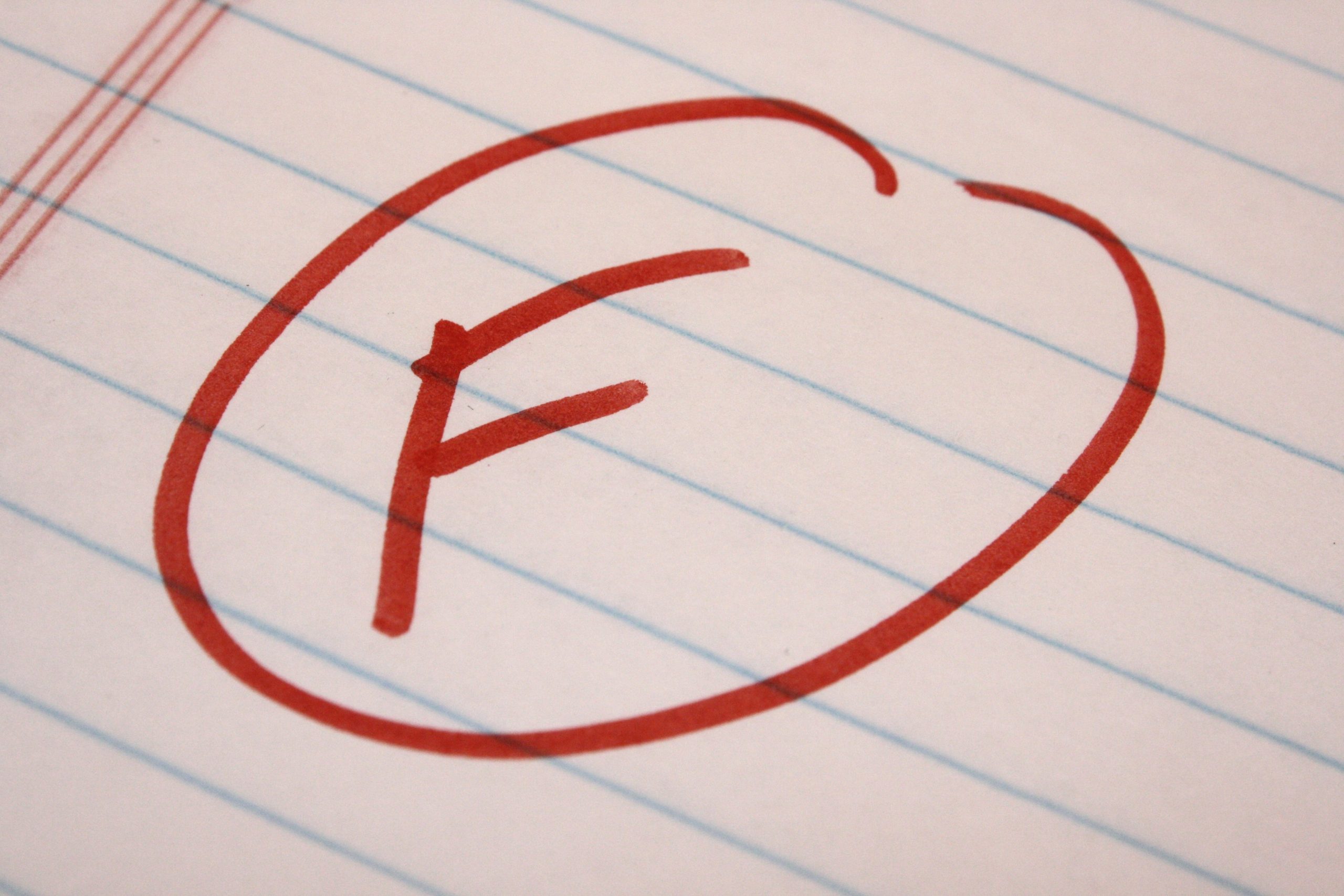
NEW YORK – GLAAD released its fourth annual Social Media Safety Index (SMSI) on Tuesday giving virtually every major social media company a failing grade as it surveyed LGBTQ safety, privacy, and expression online.
According to GLAAD, the world’s largest LGBTQ+ media advocacy organization, YouTube, X/Twitter, and Meta’s Facebook, Instagram, and Threads – received failing F grades on the SMSI Platform Scorecard for the third consecutive year.
The only exception was Chinese company ByteDance owned TikTok, which earned a D+.
Some platforms have shown improvements in their scores since last year. Others have fallen, and overall, the scores remain abysmal, with all platforms other than TikTok receiving F grades.
● TikTok: D+ — 67% (+10 points from 2023)
● Facebook: F — 58% (-3 points from 2023)
● Instagram: F — 58% (-5 points from 2023)
● YouTube: F — 58% (+4 points from 2023)
● Threads: F — 51% (new 2024 rating)
● Twitter: F — 41% (+8 points from 2023)
This year’s report also illuminates the epidemic of anti-LGBTQ hate, harassment, and disinformation across major social media platforms, and especially makes note of high-follower hate accounts and right-wing figures who continue to manufacture and circulate most of this activity.
“In addition to these egregious levels of inadequately moderated anti-LGBTQ hate and disinformation, we also see a corollary problem of over-moderation of legitimate LGBTQ expression — including wrongful takedowns of LGBTQ accounts and creators, shadowbanning, and similar suppression of LGBTQ content. Meta’s recent policy change limiting algorithmic eligibility of so-called ‘political content,’ which the company partly defines as: ‘social topics that affect a group of people and/or society large’ is especially concerning,” GLAAD’s Senior Director of Social Media Safety Jenni Olson said in the press release annoucing the report’s findings.
Specific LGBTQ safety, privacy, and expression issues identified include:
● Inadequate content moderation and problems with policy development and enforcement (including issues with both failure to mitigate anti-LGBTQ content and over-moderation/suppression of LGBTQ users);
● Harmful algorithms and lack of algorithmic transparency; inadequate transparency and user controls around data privacy;
● An overall lack of transparency and accountability across the industry, among many other issues — all of which disproportionately impact LGBTQ users and other marginalized communities who are uniquely vulnerable to hate, harassment, and discrimination.
Key Conclusions:
● Anti-LGBTQ rhetoric and disinformation on social media translates to real-world offline harms.
● Platforms are largely failing to successfully mitigate dangerous anti-LGBTQ hate and disinformation and frequently do not adequately enforce their own policies regarding such content.
● Platforms also disproportionately suppress LGBTQ content, including via removal, demonetization, and forms of shadowbanning.
● There is a lack of effective, meaningful transparency reporting from social media companies with regard to content moderation, algorithms, data protection, and data privacy practices.
Core Recommendations:
● Strengthen and enforce existing policies that protect LGBTQ people and others from hate, harassment, and misinformation/disinformation, and also from suppression of legitimate LGBTQ expression.
● Improve moderation including training moderators on the needs of LGBTQ users, and moderate across all languages, cultural contexts, and regions. This also means not being overly reliant on AI.
● Be transparent with regard to content moderation, community guidelines, terms of service policy implementation, algorithm designs, and enforcement reports. Such transparency should be facilitated via working with independent researchers.
● Stop violating privacy/respect data privacy. To protect LGBTQ users from surveillance and discrimination, platforms should reduce the amount of data they collect, infer, and retain. They should cease the practice of targeted surveillance advertising, including the use of algorithmic content recommendation. In addition, they should implement end-to-end encryption by default on all private messaging to protect LGBTQ people from persecution, stalking, and violence.
● Promote civil discourse and proactively message expectations for user behavior, including respecting platform hate and harassment policies.
Read the report here: (Link)
Research/Study
The Daily Wire: New vitamins will boost sperm & fight “wokeness”
Marketing for The Daily Wire’s venture tries to cash in on fear of trans people & drag queens promoting an alternative to “woke” companies

By Mia Gingerich | WASHINGTON – The Daily Wire announced the launch of a new “men’s lifestyle” company named Responsible Man on May 1, promoting its only current product — a men’s dietary supplement that it says is “designed to help … sharpen brain cognition” and that it suggests will help address what the outlet calls the “increasing health risk” of declining “sperm concentration.”
On April 30, The Daily Wire’s parent company Bentkey Ventures registered the assumed name “Daily Wire Ventures.” The next day, on May 1, it debuted Responsible Man, a new company for men’s health products.
The Daily Wire is promoting Responsible Man as an alternative to “woke” companies and by fearmongering about some of the outlet’s frequent targets, namely gender-affirming care and drag queens, asking its readers, “Do you want to buy your men’s health products from a company that partners with drag queens and supports radical organizations that push gender procedures on children?” Responsible Man’s website uses similar language, promising its customers that “together, we can reclaim masculinity” and claiming that “Emerson’s Vitamins are a simple step towards improving yourself, creating order, and building the future.”
Ad from Responsible Man’s website:
The Daily Wire’s promotion suggests Responsible Man’s products can help address various health issues, including the purported “increasing health risk” of declining “sperm concentration” worldwide, promising to help men stay healthy “for the survival of the human race.”
The company’s only product, a men’s multivitamin, is marketed as being “professionally engineered by medical doctors” to “support your immune system, maintain energy production, sharpen brain cognition, and support the health of your heart and muscles.”
Claims made by The Daily Wire’s new company are not FDA-approved
According to disclaimers on Responsible Man’s website, the claims made to promote the company’s vitamins “have not been evaluated by the Food and Drug Administration.” Multivitamins do not need to go through an evaluation process prior to entering the marketplace, and have generally proved ineffective in reducing the risk of heart disease and mental decline.
In the past, The Daily Wire has targeted certain medications used in gender-affirming care for trans youth for their use off-label without FDA approval, even though this is a common practice in prescribing pediatric medications. The Daily Wire’s Matt Walsh has been particularly fervent in wielding this point to target gender-affirming care.
The Daily Wire is promoting the new company by targeting Men’s Health magazine
The Daily Wire’s previous ventures into consumer goods have been framed in opposition to specific companies it deemed too “woke,” such as Harry’s Razors and Hershey’s Chocolate, for refusing to advertise with The Daily Wire and featuring a trans woman in an advertisement, respectively. (Jeremy’s Razors and Jeremy’s Chocolate, The Daily Wire’s answers to Harry’s and Hershey’s going “woke,” have received poor feedback from customers.)
The Daily Wire’s promotion of Responsible Man singles out for criticism Men’s Health, the largest men’s lifestyle magazine in the United States. Claiming that Men’s Health was “afraid of manhood itself,” The Daily Wire has declared itself “here to give you a better option.” The lone source of outrage cited by the outlet is a Men’s Health article from November 2021 on “LGBTQ+ Language and Media Literacy.”
******************************************************************************************
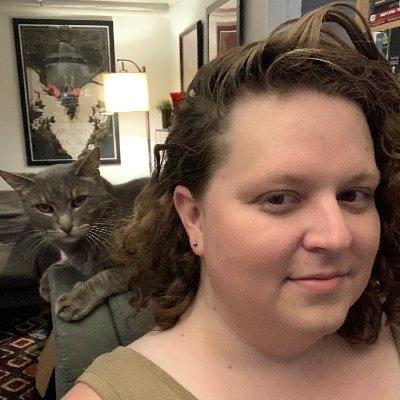
Mia Gingerich is a researcher at Media Matters. She has a bachelor’s degree in politics and government from Northern Arizona University and has previously worked in rural organizing and local media.
The preceding article was previously published by Media Matters for America and is republished by permission.
Research/Study
Half of LGBTQ+ college faculty considered moving to another state
Half of LGBTQ+ college faculty surveyed have considered moving to another state because of anti-DEI laws the Williams Institute found
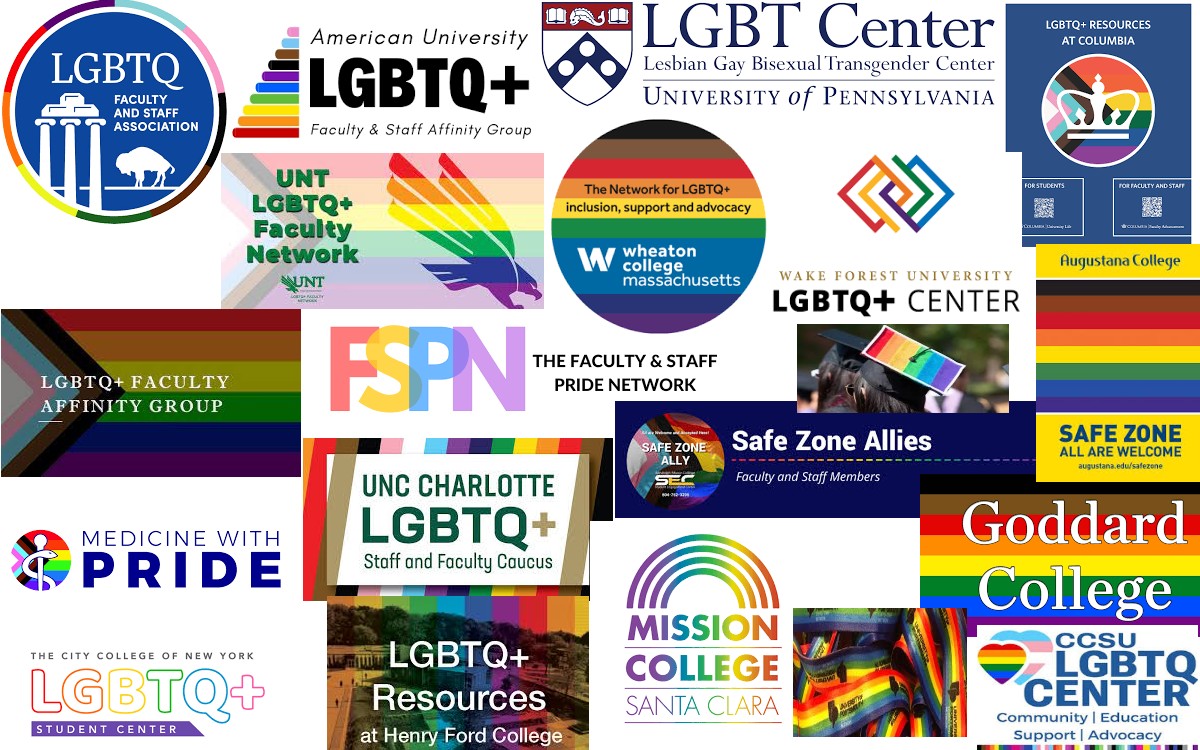
LOS ANGELES – Anti-diversity, equity, and inclusion (DEI) laws have negatively impacted the teaching, research, and health of LGBTQ+ college faculty, according to a new study by the Williams Institute at UCLA School of Law.
As a result of anti-DEI laws, about half of the LGBTQ+ faculty surveyed (48%) have explored moving to another state, and 20% have actively taken steps to do so. One-third (36%) have considered leaving academia altogether.
Nine states have passed anti-DEI legislation related to higher education, and many others are considering similar legislation.
Using data gathered from 84 LGBTQ+ faculty, most of whom work at public universities, this study examined how the anti-DEI and anti-LGBTQ+ climate has affected their teaching, lives outside the classroom, emotional and physical health, coping strategies, and desire to move.
Many faculty reported that anti-DEI laws have negatively impacted what they teach, how they interact with students, their research on LGBTQ+-related issues, and how out they are on campus and in their communities. More than one in ten faculty surveyed have faced requests for their DEI-related activities from campus administrators (14%), course enrollment declines (12%), and student threats to report them for violating anti-DEI laws (10%).
Nearly three-quarters (74%) of the LGBTQ+ faculty said the current environment has taken a toll on their mental health, and over one-quarter (27%) said it has affected their physical health.
Some LGBTQ+ faculty, particularly those who were tenured, part of a union, or well-respected on campus, have responded to anti-DEI policies by becoming more involved in advocacy and activism on (33%) and off campus (26%). Some made positive changes to their teaching, such as adding readings that provide context for LGBTQ+ content and expanding the amount of discussion during class.
“These findings suggest that anti-DEI laws could lead to significantly fewer out LGBTQ+ faculty, less course coverage of LGBTQ+ topics, and a lack of academic research on LGBTQ+ issues,” said study author Abbie E. Goldberg, Affiliated Scholar at the Williams Institute and Professor of Psychology at Clark University. “This could create a generation of students with less exposure to LGBTQ+ issues and faculty mentorship and support.”
ADDITIONAL FINDINGS:
- About 30% of participants said that their college/university communities were conservative or very conservative on LGBTQ+ issues.6% said that they had experienced harassment or been bothered by supervisors or colleagues due to their LGBTQ+ status, political affiliation, or perceived “wokeness” in the last six months.20% said that they were scared of this type of harassment.
- Nearly 30% of participants said that their home communities were conservative or very conservative on LGBTQ+ issues.5% said that they had experienced harassment or been bothered by neighbors due to their LGBTQ+ status, political affiliation, or perceived “wokeness” in the last six months.37% said that they were scared of this type of harassment.
- Over 60% of survey participants who were parents reported at least one adverse event or change had impacted their children in the past six months, including bullying and harassment (26%), removal of books from classrooms (18%), and curriculum changes (35%).
Read the report here (Link)
Research/Study
Landmark systematic review of trans surgery
Landmark systematic review concluded regret rate for trans surgeries is “remarkably low,” compared to other surgeries & major life decisions
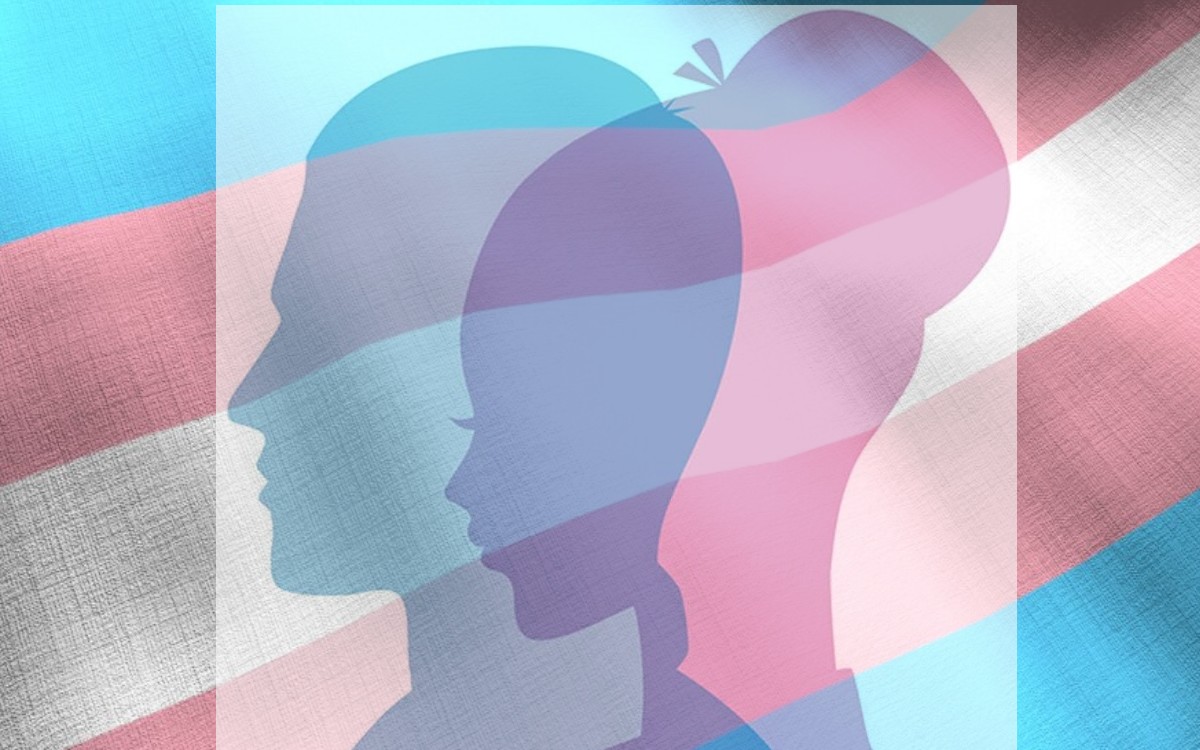
By Erin Reed | WASHINGTON – In recent years, anti-transgender activists have used fear of “regret” as justification to ban gender-affirming care for transgender youth and restrict it for many adults. Now, a new systematic review published in The American Journal of Surgery has concluded that the rate of regret for transgender surgeries is “remarkably low.”
The review encompasses more than 55 individual studies on regret to support its conclusions and will likely be a powerful tool in challenging transgender bans in the coming weeks.
The study, conducted by experts from the University of Wisconsin School of Medicine and Public Health, examines reported regret rates for dozens of surgeries as well as major life decisions and compares them to the regret rates for transgender surgeries.
It finds that “there is lower regret after [gender-affirming surgery], which is less than 1%, than after many other decisions, both surgical and otherwise.” It notes that surgeries such as tubal sterilization, assisted prostatectomy, body contouring, facial rejuvenation, and more all have regret rates more than 10 times as high as gender-affirming surgery.
You can see regret rates for many of the surgeries they examined in the review here:
The review also finds that regret rates for gender-affirming surgeries are lower than those for many life decisions. For instance, the survey found that marriage has a regret rate of 31%, having children has a regret rate of 13%, and at least 72% of sexually active students report regret after engaging in sexual activity at least once. All of these are notably magnitudes higher than gender affirming surgery.
Regret is commonly weaponized against transgender care. The recently released Cass Review, currently being used in an attempt to ban transgender care in England, mentions “regret” 20 times in the document. Pamela Paul’s story in The New York Times features stories of regret heavily and objects to reports of low regret rates. Legislators use the myth of high levels of regret to justify harsh crackdowns on transgender care.
Recently, though, anti-trans activists who have pushed the idea that regret may be high appear to be retreating from their claims. In the WPATH Files, a highly editorialized and error-filled document targeting the World Professional Association for Transgender Health, the authors state that the low levels of regret for transgender people obtaining surgery are actually cause for alarm, and that transgender people are “suspiciously” happy.
The idea that transgender people cannot be trusted to report their own happiness and regret has also been echoed by anti-transgender activists and influencers like Matt Walsh and Jesse Singal.
The review has sharp critiques for those who use claims of “regret” to justify bans on gender affirming care: “Unfortunately, some people seek to limit access to gender-affirming services, most vehemently gender-affirming surgery, and use postoperative regret as reason that care should be denied to all patients. This over-reaching approach erases patient autonomy and does not honor the careful consideration and multidisciplinary approach that goes into making the decision to pursue gender-affirming surgery… [other] operations, while associated with higher rates of post-operative regret, are not as restricted and policed like gender-affirming surgery.”
The review is in line with recent data supporting very low regret rates for transgender people. The 2022 U.S. Transgender Survey, the world’s largest survey of transgender individuals, which surveyed over 90,000 transgender people, found that for those receiving hormone therapy, regret rates are incredibly low: less than 1% report being a little or a lot less satisfied after beginning hormone therapy.
You can view a chart from the 2022 US Transgender Survey showing low rates of regret for hormone therapy here:
There is no evidence that transgender people experience high rates of regret for any transgender care, including transgender surgery. On the contrary, gender-affirming care saves lives.
A Cornell review of more than 51 studies found that gender-affirming care significantly improves the well-being of transgender individuals and also concluded that regret is rare. Low rates of regret for transgender people are not “suspicious.” Rather, they are evidence that the care transgender people seek is important, carefully provided, and helps them live more fulfilled lives.
****************************************************************************

Erin Reed is a transgender woman (she/her pronouns) and researcher who tracks anti-LGBTQ+ legislation around the world and helps people become better advocates for their queer family, friends, colleagues, and community. Reed also is a social media consultant and public speaker.
******************************************************************************************
The preceding article was first published at Erin In The Morning and is republished with permission.
Research/Study
90 percent of trans youth live in states restricting their rights
Slightly more than 75% of trans youth live in 40 states passed laws or had pending bills that restrict access to gender-affirming care
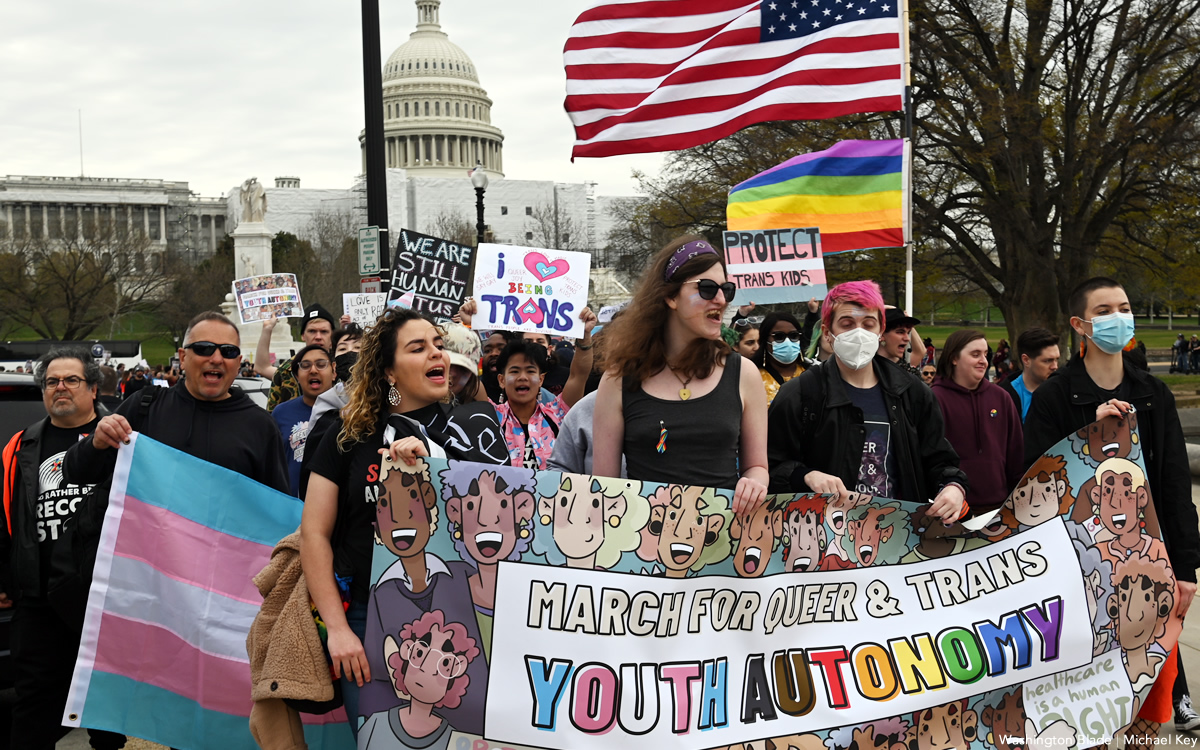
LOS ANGELES – According to a new report by the Williams Institute at UCLA School of Law, 93% of transgender youth aged 13 to 17 in the U.S.—approximately 280,300 youth—live in states that have proposed or passed laws restricting their access to health care, sports, school bathrooms and facilities, or the use of gender-affirming pronouns.
In some regions, a large percentage of transgender youth live in a state that has already enacted one of these laws. About 85% of transgender youth in the South and 40% of transgender youth in the Midwest live in one of these states.
An estimated 300,100 youth ages 13 to 17 in the U.S. identify as transgender. Nearly half of transgender youth live in 14 states and Washington D.C. that have laws that protect access to gender-affirming care and prohibit conversion therapy.
All transgender youth living in the Northeast reside in a state with either a gender-affirming care “shield” law or a conversion therapy ban, while almost all transgender youth in the West (97%) live in a state with one or both protective laws.
“For the second straight year, hundreds of bills impacting transgender youth were introduced in state legislatures,” said lead author Elana Redfield, Federal Policy Director at the Williams Institute. “The diverging legal landscape has created a deep divide in the rights and protections for transgender youth and their families across the country.”
KEY FINDINGS:
Restrictive Legislation
Bans on gender-affirming care
| 237,500 transgender youth—slightly more than three-quarters of transgender youth in the U.S.—live in 40 states that have passed laws or had pending bills that restrict access to gender-affirming care.113,900 transgender youth live in 24 states that have enacted gender-affirming care bans.123,600 youth live in 16 additional states that had a gender-affirming care ban pending in the 2024 legislative session. |
Bans on sports participation
| 222,500 transgender youth—nearly three-quarters of transgender youth in the U.S.—live in 41 states that have passed laws or had pending bills that restrict participation in school sports.120,200 transgender youth live in 27 states where access to sports participation is restricted or state policy encourages restriction.102,300 transgender youth live in 14 additional states that had a sports ban pending in the 2024 legislative session. |
School bathroom bans
| 117,000 transgender youth live in 30 states that have passed laws or had pending bills that ban transgender students from using school bathrooms and other facilities that align with their gender identity.38,600 transgender youth live in 13 states that explicitly or implicitly ban bathroom access.78,400 transgender youth live in 17 additional states that had a bathroom ban pending in the 2024 legislative session. |
Bans on pronoun use
| 121,100 transgender youth live in 31 states that have passed laws or had pending bills that restrict or prohibit the use of gender-affirming pronouns.49,100 transgender youth live in 14 states that have restricted or banned pronoun use, particularly in schools or state-run facilities.72,000 transgender youth live in 17 additional states that had a restriction or prohibition pending in the 2024 legislative session. |
Gender-affirming care “shield” laws
| 163,800 transgender youth—over half of transgender youth in the U.S.—live in 18 states and D.C. that have passed gender-affirming care “shield” laws or had pending bills that protect access to care.146,700 transgender youth live in 14 states and D.C. that have passed these protections.17,100 transgender youth live in four additional states that had a “shield” law pending in the 2024 legislative session. |
Conversion therapy bans
| 204,800 transgender youth live in 31 states and D.C. that ban conversion therapy or had pending bills that prohibit the practice for minors.198,000 transgender youth—about two-thirds of transgender youth in the U.S.—live in 27 states and D.C. that ban conversion therapy for minors.6,800 transgender youth live in four additional states that had a ban pending in the 2024 legislative session. |
| “A growing body of research shows that efforts to support transgender youth are associated with better mental health,” said co-author Kerith Conron, Research Director at the Williams Institute. “Restrictions on medically appropriate care and full participation at school exacerbate the stress experienced by these youth and their families.” |
Read the report: (Here)
-

 Breaking News4 days ago
Breaking News4 days agoMajor victory for LGBTQ funding in LA County
-

 Features4 days ago
Features4 days agoKoaty & Sumner: Finding love in the adult industry
-

 Commentary2 days ago
Commentary2 days agoBreaking the mental health mold with Ketamine: insights from creator of Better U
-

 Miscellaneous3 days ago
Miscellaneous3 days agoCan you really find true love in LA? Insights from a queer matchmaker
-

 El Salvador4 days ago
El Salvador4 days agoLa marcha LGBTQ+ desafía el silencio en El Salvador
-

 Arts & Entertainment3 days ago
Arts & Entertainment3 days agoIntuitive Shana gives us her hot take for July’s tarot reading


